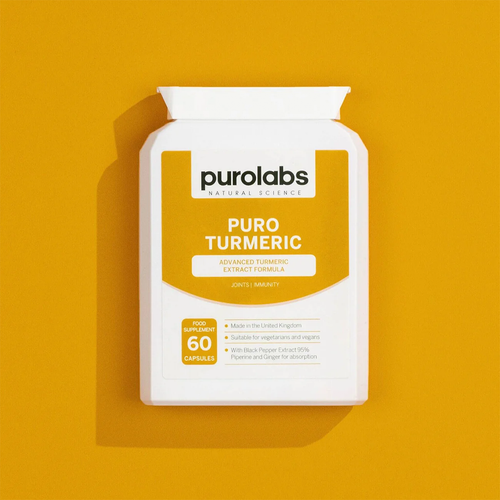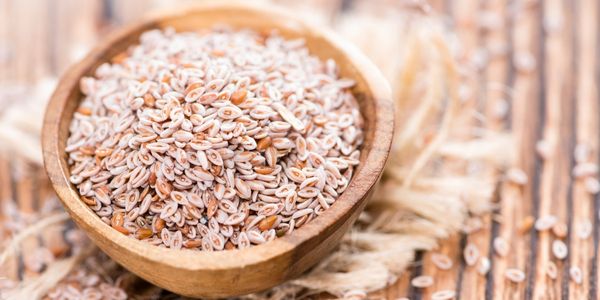You may have heard of trying medicinal home remedies to combat a sore throat, tackle poor sleep, boost energy and relaxation, or relieve painful stiff joints to name a new ailments.
Whilst the hard-core scientific evidence for many claimed benefits is lacking, there are countless anecdotal stories being passed down from generation to generation touting their therapeutic uses.
Take honey and lemon for example, which have relieved many sore throats due to their antibacterial properties1, or the benefits of chamomile steeped in hot water for a restful night’s sleep due to its calming effects on the nervous system.
Turmeric is another medicinal food item celebrated for its potentially anti-inflammatory benefits.
This potent spice, which is native to tropical south Asia, belongs to the ginger family (Zingiberaceae), and is known fondly as the ‘golden spice’. In recent years, turmeric has been studied for its therapeutic benefits, with the science beginning to back up historic claims.
Turmeric is known as a superfood for many reasons:
- It’s been shown to potentially help with inflammatory skin conditions like eczema, acne, and dermatitis2
- May help slow the progression of neurological diseases3
- It has even been shown to have anti-cancer properties4
- Mitigate the inflammatory effects of stress on the body
- Helps to combat infections5
Here’s the bottom line, which I’m already going to state in the intro of this article. What makes turmeric so powerful for human health is the fact that chronic inflammation generally leads to disease. As turmeric is a potent anti-inflammatory, it is helping to fight inflammation and bring the body back into balance.
We may be discussing turmeric’s effects on arthritis in this article, however if you or a loved one suffers with chronic inflammation of any kind, then I highly recommend you try a good quality turmeric supplement like the one we have formulated here at Purolabs.
Our turmeric supplement contains 300mg of 95% turmeric extract which is the equivalent of 15,000mg of turmeric! Far more than you ever can (or want to) ingest daily with turmeric alone. The benefits of supplementing with turmeric outweigh eating turmeric as the doses are potent, highly concentrated and traced from guaranteed premium quality sources.

Turmeric
What is arthritis?
In this article we are discussing turmeric’s effects on arthritis, therefore it may be best to provide a description of what arthritis actually is.
To put it briefly, arthritis is an inflammatory condition which leads to the gradual, inflammatory, and progressive wear and tear of joints, cartilage, and bone. Many describe arthritis as an auto-immune condition due to the corrosive effect of inflammation on the structures that make up our body that ‘attack’ our tissues.
Studies have even linked intestinal permeability aka ‘leaky gut’ to arthritis, which may help explain the autoimmune link. If gut integrity is impaired, ingested microscopic food particles can escape the thin tears of the gut lining and enter the bloodstream, causing the immune system to respond by inaccurately ‘attacking’ parts of itself6. In rheumatoid arthritis for example, this may be the ankle or wrist joints causing intense pain, discomfort, and immobility of affected joints.
Arthritis can be diagnosed as part of a few conditions:
Osteoarthritis – More commonly diagnosed in post-menopausal women, osteoarthritis is the degenerative wear of bones, and supporting tissues7.
Rheumatoid Arthritis (RA) – RA generally affects the hands, feet and wrists and is the ‘type’ of arthritis diagnosed most commonly in younger adults8.
Psoriatic Arthritis - Psoriatic arthritis affects about a third of people who have psoriasis and is an inflammatory skin disorder9.
Lupus – Is a chronic autoimmune disease which can affect any part of the body. It is most commonly diagnosed in women of childbearing age and can present as pain, swelling, fatigue to name a few10.
Gout – Gout ‘attacks’ can be sudden and involve intense severe joint pain which can last for several days. It is also known as gouty arthritis and can be triggered by a build-up of uric acid, leading to an inflammatory response11.
How Does Turmeric Help with Arthritis
Although I’ve mentioned it previously, it is without a doubt, the anti-inflammatory properties that make turmeric the supplement of all joint supplements to aid with arthritis and other inflammatory diseases.
Curcumin, which is the active component found in turmeric, is the gold found at the end of the rainbow when it comes to pain relief. Curcumin is the element of turmeric which lends to the majority of what makes it such a powerful superfood.
A study reviewing eight large-scale studies found that supplementing with 1,000mg per day of curcumin aided arthritic symptom relief12, making turmeric supplementation really worth considering if you are experiencing pain, swelling and/or joint stiffness.
Curcumin has also been shown to be an effective and safe option to help reduce the symptoms of osteoarthritis if taken consistently for at least twelve weeks13.
As mentioned, arthritis can be described as an auto-immune condition.
An auto-immune condition occurs when the immune system is chronically ‘triggered’ and responds by unintentionally attacks its own tissues. When the immune system is attacking itself, the cells of the tissues it is attacking secrete an enzyme called COX2.
COX2 attracts inflammatory cytokine cells to attack the target tissue increasing inflammation in the joints and ligaments, for example. Research suggests that curcumin, if taken consistently for several months may decrease COX2 levels and reduce the inflammatory response that auto-immune conditions bring.
A study even compared curcumin to NSAIDs (anti-inflammatory drugs) on its effects for pain relief to find that large dose curcumin was comparable to NSAIDs like naproxen in helping to reduce joint pain and swelling14. Although the results are from an animal study, it does provide promising results for further research.
So, Should you Consider Taking Turmeric for Arthritis?
The studies show that there is real promising evidence that high doses of curcumin taken daily for at least several months can help alleviate the symptoms of arthritis.
Turmeric has also been shown to help reduce auto-immune processes in the body which lead to tissue degradation and inflammation which can be seen in all ‘types’ of arthritis.
It is also important to note that although supplementing with strong-dose turmeric, it is equally important to adopt an anti-inflammatory diet to help ease symptoms.
The Mediterranean diet has been proven repeatedly to reduce inflammation as the diet is incredibly antioxidant rich with fatty fish, olive oil and wholefoods dietary staples. If you suffer with chronic inflammation of any kind, a well-balanced Mediterranean diet can help alleviate many symptoms.





















